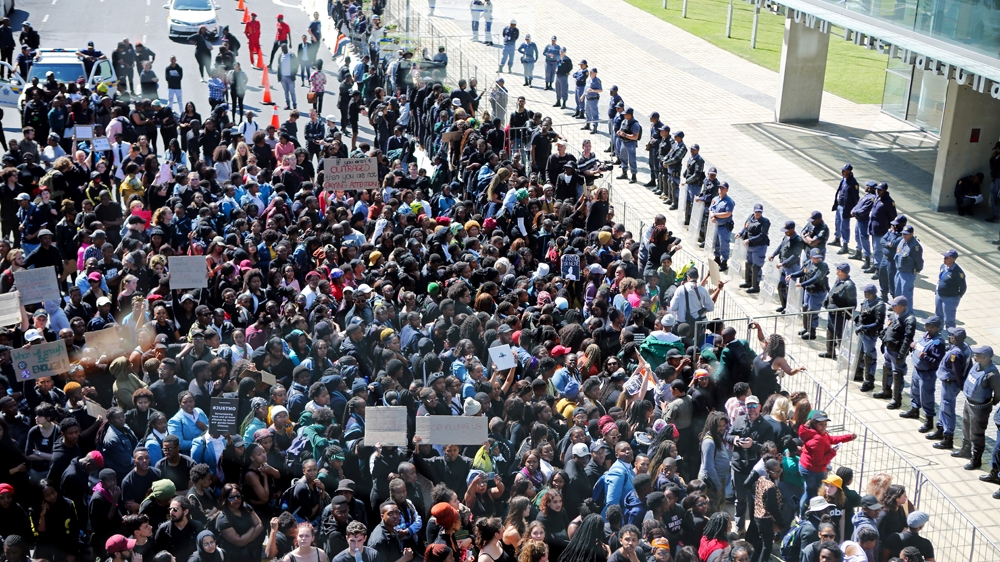Attacks on foreigners must stop, Ramaphosa says at summit
South Africa is hosting the World Economic Forum on Africa but xenophobic violence threatens to overshadow the event.

South African President Cyril Ramaphosa has told officials and business leaders that he was committed to quelling attacks on foreigners that have threatened to cast a cloud over an economic forum aimed at boosting intra-African trade.
Police have arrested dozens of people and confirmed several deaths after riots in Johannesburg and the executive capital, Pretoria, in recent days.
Keep reading
list of 4 itemsShip that caused deadly Baltimore Key bridge collapse towed to port
‘Why should we vote?’ India’s jute workers blame politicians for woes
California farmworkers cheer new housing in town scarred by mass shooting
It is unclear what ignited the latest round of violence, but analysts say contributing factors include high unemployment and frustration with limited economic opportunities.
The wave of unrest has kindled memories of previous deadly attacks on foreigners and strained diplomatic relations with Africa’s other economic powerhouse, Nigeria.
South African businesses MTN and Shoprite closed shops in Nigeria on Wednesday after their facilities in the country came under attack.
Other African countries from Ghana to Ethiopia – along with the regional bloc the African Union – have called on Ramaphosa to take decisive action.
Artists and citizens from across the continent have taken to social media to voice their anger, with some threatening retaliation.
“Taking action against people from other nations is not justified and should never be allowed in our beautiful country … We need to quell those incidents of unrest,” Ramaphosa told those attending an event on the sidelines of the World Economic Forum’s (WEF) Africa three-day summit, which started on Wednesday.
“South Africa must be a country where everyone feels safe, including women and foreign nationals,” Ramaphosa said, also condemning recent incidents where women have been killed.
Protests and cancellations
Rwandan President Paul Kagame and Malawi‘s President Peter Mutharika pulled out of the conference at the last minute, prompting speculation in South African media that the no-shows were linked to the attacks on foreigners.
But WEF spokesman Oliver Cann said Kagame and Mutharika had informed conference organisers that they could not attend by Saturday, before the attacks had started.
Zimbabwe Foreign Affairs Minister Sibusiso Moyo, who was part of a large Zimbabwean government contingent including President Emmerson Mnangagwa, said the recent attacks were “unfortunate”.
“It is unfortunate that African brothers go against each other neck on neck in that kind of scenario, in an environment where we are looking forward to regional integration and cooperation and where Africa as a whole has embraced the continental free trade agreement as a bedrock of integration,” Moyo told Reuters news agency.
“We just implore our brothers in the region to note that peaceful coexistence is one of the key fundamentals,” he said.

There are a significant number of Zimbabweans living in South Africa and they have formerly borne the brunt of attacks on foreigners, along with Somalians and Nigerians.
Hundreds of University of Zambia students, dressed mostly in black and chanting “No violence!” protested outside the South African high commission against the attacks on foreigners on Wednesday.
On Tuesday, the Football Association of Zambia (FAZ) called off the country’s friendly international match against South Africa in Lusaka, Zambia on Saturday, citing “prevailing security concerns in South Africa”.
Hundreds of mainly female students protesting about violence against women tried to storm the conference centre in Cape Town where the WEF meeting was being held, but they were restrained by a heavy police presence.
The protesters shouted slogans such as “We want justice!” and sang songs from the struggle against apartheid while conference delegates peered through glass to watch the spectacle.